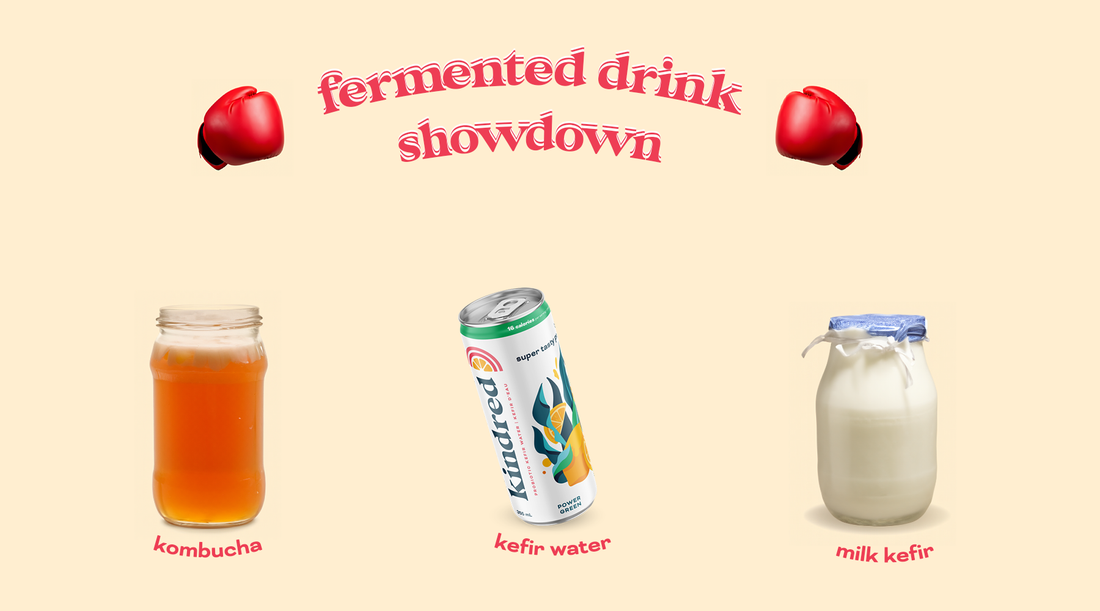
Kefir Water, Kombucha, or Milk Kefir: Which Is the Ultimate Fermented Drink?
Share
"So it's like kombucha?" This is probably the 2nd most asked question we get, right after, "What is this?"
And it is—kind of! We like to think of our Kefir Water as a cousin to kombucha and milk kefir.
You've probably heard about all the different trendy fermented drinks, but you may not be sure what makes them 'relatives', or which one is right for you. Each of these drinks offers unique benefits and flavours, but how do they differ from each other? Let's take a closer look at kefir water, kombucha, and milk kefir, and the key differences between each one.
Kombucha: The ✨Popular One✨

Being thousands of years old, 'kombucha' is definitely one of the most well-established terms in the fermented drink scene. Made from tea, sugar, and a SCOBY (which stands for Symbiotic Culture Of Bacteria and Yeast), kombucha is known for its unique tangy flavour and slight fizziness. Its unique flavour profile can change drastically depending on the brewing process, types of bacteria and yeast in the SCOBY, and ingredients used, making each one a little different.
It does take a while to ferment—usually a week is the minimum, up to a month. Any longer, and you'll likely find yourself with kombucha vinegar! During this time, the bacteria and yeast are working hard to break down sugar and multiply themselves. Due to the bacteria and yeast species in the SCOBY, typically the nature of kombucha is more of a digestive aid rather than a probiotic (since lactic acid bacteria, LAB, tend to be lacking), but it's great for your gut nonetheless.
As one of the first vegan and naturally fermented beverages to be popularized in the grocery stores, it's no wonder it's now a household name.
Milk Kefir: The Creamy One

You may or may not have heard of milk kefir, but it's definitely been around for a while (it's got a couple thousand years under its belt, just like kombucha). Made from a SCOBY known as 'kefir grains,' and milk, this kefir is creamy, tangy, and packed with probiotics.
Most milk kefir refers to non-vegan products, usually made from cow's or goat's milk. The SCOBY will ferment the naturally occurring lactose, meaning there is no need to add additional sugar for this process to get started. This is called 'lactic acid fermentation,' and will produce millions and billions of LAB, making it a great source of probiotics. The amount of time needed for fermentation is also much shorter than kombucha, with a typical cycle only being between 24-48hours.
These days, there's been an uptick in popularity for milk kefir of the non-dairy variety, for those who adhere to a plant-based diet. These beverages are most notably made using coconut milk, but other varieties of plant-based milks may be used as well. Since plant-based milks do not contain lactose, there is often some sugar added in the creation of these beverages, so the SCOBY has food for fermentation.
Kefir Water: The Happy Medium

Kefir water is like the middle cousin of the kombucha and milk kefir. Unlike its relatives, the origins of kefir water are relatively unknown, with different sources citing different locations and points in time for its discovery. It's made from water kefir grains (which are similar to those used in milk kefir) and sugar water. The result is a slightly fizzy, sweet drink—less tart and acidic than kombucha, and caffeine-free.
Similar to milk kefir, kefir water undergoes lactic acid fermentation, producing LABs that make it a great source of probiotics. How? The SCOBY for kefir water, while very similar to the one in milk kefir, uses sucrose instead of lactose for its fermentation (this is why sugar is needed, since water is just water). This allows similar LAB varieties to be present in kefir water, even though it is completely vegan. Fermentation is also quick like milk kefir!
Kefir water was the new kid on the block for a while, but slowly more and more types are popping up on the market. Our hope is that it one day reaches the same celebrity status as kombucha!
Which One Should You Choose?
Well, it all depends on your taste preferences and dietary restrictions! Kombucha is perfect for tea lovers who love tart flavours and could use some digestive help, and milk kefir is ideal for those who can tolerate lactose and really want to get in their probiotics. Kefir water is great for those who are dairy-free but still want to stock up their system on probiotics, have caffeine sensitivity, and prefer lighter, sweeter beverages.
Ultimately, the best way to take care of your gut is to eat and drink a wide variety of fermented foods, so why not try them all? Each fermented beverage has its very own unique ecosystem of belly-balancing bacteria and yeast that is ready to get to work on making you feel great! So, raise a glass (or a can!) and cheers to good gut health!
